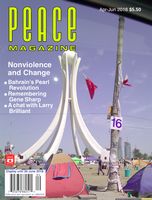
Peace Magazine Apr-Jun 2018, page 4. Some rights reserved.
Search for other articles by Metta Spencer here
Democracy is declining around the world. Doug Saunders will discuss that trend and some bright spots in his after-dinner speech to the “How to Save the World in a Hurry” forum on May 30th. There are disturbing changes even in such countries as Canada—mostly regarding freedom of speech. This is less evident in government itself than in civil society (especially universities) where people are now more concerned to protect themselves and overly sensitive friends FROM unwanted messages than to preserve the freedom TO speak their minds. Also, the pre – valence of easy messaging technologies has made us start hiding from each other, e.g. by keeping our phone numbers and email addresses secret. (I too want to outlaw that Duct Cleaning guy.)
But the side effects of the current trend can be serious. Most people who want to call you have a good reason, and you lose more than you gain by blocking their speech. Likewise, research shows that groups make worse decisions if they silence members who are giving information they don’t want to hear.
But we all know authoritarian chairpersons, even in progressive organizations, who do not give the floor to anyone whose ideas they oppose. While pathological, this is also normal, for every group naturally prefers warm unanimity over dissension and is prone to “groupthink”— the suppression of unwanted messages, first by despatching a “mind guard” to bring the deviant member back into line, and eventually, if necessary, by expelling him or her. Anyone who persistently calls attention to inconvenient facts or obligations may be subjected to such punishment. This is especially dangerous if the “groupthinkers” manage to suppress important truths that they actually need to know. President Kennedy made a bad decision about the Bay of Pigs because of groupthink among his advisers. As Irving Janis showed, he realized his mistake and thereafter encouraged the same advisers to express their misgivings. This did not guarantee perfect decisionmaking, but it did keep the US from attacking the Soviet Union during the Cuban Missile Crisis. There’s a lesson there.
To be sure, sometimes group members can be obnoxious, but to silence even the worst of them is both undemocratic and unnecessary. An argument goes on only as long as the speaker is met by resistance. A good leader facing unwelcome information does not argue endlessly against it but simply says, “Thank you for sharing. We will take account of your important point. Now let’s move on.” And then he will truly think about what he has heard.
Let peace begin with me. Let democracy begin with my peace group.
Our Zoom video chat with three or four friends about a global issue will be live-streamed to the Peace Magazine Facebook page from 8:00 to 9:00 pm EDT every Monday. Anyone in the world with Internet can watch and those with a Facebook account can ask live questions too. The technology isn’t equal to network TV yet, but we are getting the hang of it. After watching a show, you can write your opinion to the editor for the next issue of Peace.
A website has been created to provide bibliographies and videos to prepare everyone who is studying up for the forum, “How to Save the World in a Hurry.” It will remain accessible after the forum, along with the whole list of proposals submitted for possible inclusion on the Platform for Survival. There is also a space for you to discuss these global issues and appraise the innovative proposals for improving humankind’s quality of life. Please visit www.tosavetheworld.ca.
A two-day forum 9:00 – 5:00 pm at 15 Kings College Circle, U. of Toronto
May 30: Q and A sessions about war and weapons, global warming, famine, pandemics, massive radiation exposure, and cyber attacks. Expert speakers (some not yet confirmed) include Senator Douglas Roche, Mark Jacobson, Paul Hawken, Larry Brilliant, Gordon Edwards, Angela Bischoff, Rhoda Howard Hassmann, and David Harries. That evening we will enjoy a dinner together in a nearby restaurant where Doug Saunders of the Globe and Mail will give an after-dinner talk about the current challenges to democracy.
May. 31: Breakout groups with resource persons present will appraise suggestions and pick public policy innovations to reduce the risks of all six of these global crises, plus additional enabling measures to address such challenges as financing, global governance and security, and inequality. The end product, a single page listing 25 policy proposals, will be the “Platform for Survival” When endorsed by civil society groups and experts, it will be useful as a shared agenda for world work.
Registration for the forum and dinner must be purchased in advance. www.eventbrite.com/e/forum-how-to-save-the-world-in-a-hurry-tickets-44179625449 General admission: $100. Students and unwaged $40. Dinner on May 30: $35. Before the forum, it is a good idea to read the proposals that have been submitted for possible inclusion on the Platform, and watch video lectures on the forum website: www.tosavetheworld.ca.

Peace Magazine Apr-Jun 2018, page 4. Some rights reserved.
Search for other articles by Metta Spencer here